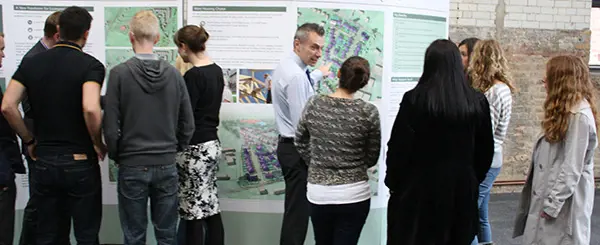The recent judgment of the Supreme Court in relation to Suffolk Coastal District Council v Hopkins Homes and Richborough Estates v Cheshire East Borough Council raised a number of wider implications for planning, not least concerns regarding the role of the courts in planning decision-making and the over-legalisation of the planning process. For a number of years now, developers and landowners have used the judicial review process as a means of holding planning decision- makers to account, and ensuring the rigour of the planning system generally. Lichfields’ Newcastle office’s latest first-hand experience of the process in action offers helpful insight into both the workings of, and interrelationship between, England’s planning and legal systems, and the idiosyncrasies of a particularly well-used provision of the Planning Acts.
The case centred on the use of Section 73 (s73) of the Town and Country Planning Act 1990, which allows applicants to seek permission for a minor material amendment (‘MMA’) to a previously approved scheme. In this specific case, a developer in York had obtained planning permission for a mixed use development described as:
Erection of 8,000 seat community stadium, leisure centre, multi-screen cinema, retail units, outdoor football pitches, community facilities and other ancillary uses...
Planning permission was granted subject to a number of conditions, including a requirement for the development to be in accordance with various approved plans. A short time later, the developer sought to update these plans by way of an MMA application. Amongst other amendments, the MMA application included increasing the capacity of the cinema by around 20%, and increasing the overall amount of floorspace made up of town centre uses by around 40%. Lichfields were subsequently appointed by an existing cinema operator in York to review the s73 application, in light of the potential adverse impact on their own business.
During the course of this process it became apparent that the key question for the local planning authority to consider was whether, in fact, an alteration of this scale to the approved scheme could lawfully be approved (or indeed validated and then determined) by way of an MMA application. National Planning Practice Guidance advises :
There is no statutory definition of a ‘minor material amendment’ but it is likely to include any amendment where its scale and/or nature results in a development which is not substantially different from the one which has been approved.
The local planning authority contended that the proposed amendments were acceptable in this context, and proceeded to approve the application.
During the six week judicial review challenge period following the grant of planning permission, Lichfields worked with Counsel to review the appropriate case law and primary legislation. This process indicated that guidance on the issue is less than clear. Whilst Planning Practice Guidance acknowledges there is no statutory definition of an MMA it is, by definition, inferred that the changes sought by such an application must constitute ‘minor’ alterations.
High Court Judge Mr Justice Collins agreed that our client’s case was arguable, and a hearing at the Queen’s Bench Division in London was scheduled for January 2017. At the hearing, Counsel put forward the cases for the claimant and defendant respectively; each essentially focusing on v Coventry City Council Ex p. Arrowcroft Group Plc (2001). In summing up, Justice Collins contended that Arrowcroft established that, whilst there was no statutory definition of an MMA, the key principle is that it is not open to the local planning authority to vary a condition if that variation means that the precise terms of the original permission (i.e. the description of development) were changed by it. This reflects the wording of s73 itself, which states only that:
"(1) This section applies, subject to subsection (4), to applications for planning permission for the development of land without complying with conditions subject to which a previous planning permission was granted.
(2) On such an application the local planning authority shall consider only the question of the conditions subject to which planning permission should be granted, and—
(a) if they decide that planning permission should be granted subject to conditions differing from those subject to which the previous permission was granted, or that it should be granted unconditionally, they shall grant planning permission accordingly, and
(b) if they decide that planning permission should be granted subject to the same conditions as those subject to which the previous permission was granted, they shall refuse the application."
In part, this reflects the retro-fitting exercise undertaken by Government in utilising s73 to regularise the format in which applicants seek post-permission amendments to schemes. In itself, however (and possibly at odds with Planning Practice Guidance), s73 fails to limit the extent of changes sought through MMA applications in terms of how ‘minor’ or indeed ‘substantial’, they are in practice.
In York, the description of development for the original scheme was sufficiently vague, such that no reasonable change to the scale or capacity of the cinema in isolation could negate the appropriate use of s73. This in itself is an important lesson for applicants, and ensuring local planning authorities don’t tamper with a description of development prior to the validation of an application could be key to retaining the future flexibility of a planning permission.
Nevertheless, the whole judicial review process proved invaluable in untangling policy guidance which was admittedly never intended as a purpose-made solution. For planning consultants, this relationship between the legal and planning systems plays an integral role in assuring applicants of the robustness (and indeed lawfulness) of their planning decisions. Without these checks and balances in place, it is arguable that the whole planning process could become less fair and balanced, particularly given the fragmented nature of much current planning policy. For our client, this meant challenging a questionable decision through the courts over a period of six months or so. It is to everyone’s benefit within the planning sector that such a process exists, and can be utilised where necessary.






